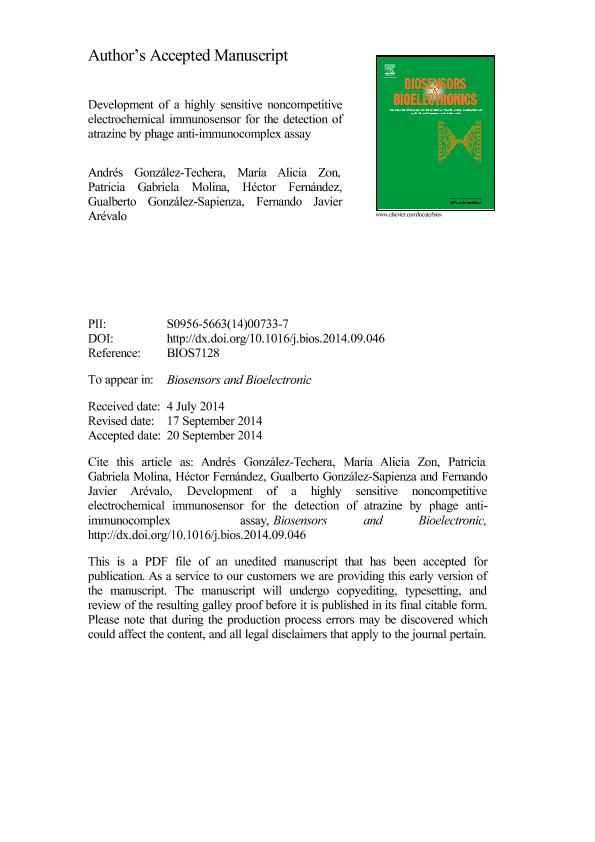Mostrar el registro sencillo del ítem
dc.contributor.author
González Techera, Andrés
dc.contributor.author
Zon, María Alicia

dc.contributor.author
Molina, Patricia Gabriela

dc.contributor.author
Fernandez, Hector

dc.contributor.author
González Sapienza, Gualberto
dc.contributor.author
Arevalo, Fernando Javier

dc.date.available
2018-01-30T18:12:00Z
dc.date.issued
2014-09
dc.identifier.citation
González Techera, Andrés; Zon, María Alicia; Molina, Patricia Gabriela; Fernandez, Hector; González Sapienza, Gualberto; et al.; Development of a highly sensitive noncompetitive electrochemical immunosensor for the detection of atrazine by phage anti-immunocomplex assay; Elsevier Advanced Technology; Biosensors & Bioelectronics; 64; 9-2014; 650-656
dc.identifier.issn
0956-5663
dc.identifier.uri
http://hdl.handle.net/11336/35037
dc.description.abstract
The development of immunosensors for the detection of small molecules is of great interest because of their simplicity, high sensitivity and extended analytical range. Due to their size, small compounds cannot be simultaneously recognized by two antibodies impeding their detection by noncompetitive two-site immunoassays, which are superior to competitive ones in terms of sensitivity, kinetics, and working range. In this work, we combine the advantages of magneto-electrochemical immunosensors with the improved sensitivity and direct proportional signal of noncompetitive immunoassays to develop a new Phage Anti-Immunocomplex Electrochemical Immunosensor (PhAIEI) for the detection of the herbicide atrazine. The noncompetitive assay is based on the use of recombinant M13 phage particles bearing a peptide that specifically recognizes the immunocomplex of atrazine with an anti-atrazine monoclonal antibody. The PhAIEI performed with a limit of detection (LOD) of 0.2 pg mL−1, which is 200-fold better than the LOD obtained using the same antibody in an optimized conventional competitive ELISA, with a large increase in working range. The developed PhAIEI was successfully used to assay undiluted river water samples with no pretreatment and excellent recoveries. Apart from the first demonstration of the benefits of integrating phage anti-immunocomplex particles into electrochemical immunosensors, the extremely low and environmentally relevant detection limits of atrazine attained with the PhAIEIS may have direct applicability to fast and sensitive detection of this herbicide in the environment.
dc.format
application/pdf
dc.language.iso
eng
dc.publisher
Elsevier Advanced Technology

dc.rights
info:eu-repo/semantics/openAccess
dc.rights.uri
https://creativecommons.org/licenses/by-nc-sa/2.5/ar/
dc.subject
Anti-Immunocomplex Peptide
dc.subject
Immunosensor
dc.subject
Atrazine
dc.subject
Chronoamperometry
dc.subject.classification
Otras Ciencias Químicas

dc.subject.classification
Ciencias Químicas

dc.subject.classification
CIENCIAS NATURALES Y EXACTAS

dc.title
Development of a highly sensitive noncompetitive electrochemical immunosensor for the detection of atrazine by phage anti-immunocomplex assay
dc.type
info:eu-repo/semantics/article
dc.type
info:ar-repo/semantics/artículo
dc.type
info:eu-repo/semantics/publishedVersion
dc.date.updated
2018-01-29T19:46:02Z
dc.journal.volume
64
dc.journal.pagination
650-656
dc.journal.pais
Países Bajos

dc.journal.ciudad
Amsterdam
dc.description.fil
Fil: González Techera, Andrés. Universidad de la República; Uruguay
dc.description.fil
Fil: Zon, María Alicia. Universidad Nacional de Rio Cuarto. Facultad de Cs.exactas Fisicoquímicas y Naturales. Departamento de Química. Area Electroquímica; Argentina. Consejo Nacional de Investigaciones Científicas y Técnicas; Argentina
dc.description.fil
Fil: Molina, Patricia Gabriela. Universidad Nacional de Rio Cuarto. Facultad de Cs.exactas Fisicoquímicas y Naturales. Departamento de Química. Area Electroquímica; Argentina. Consejo Nacional de Investigaciones Científicas y Técnicas; Argentina
dc.description.fil
Fil: Fernandez, Hector. Universidad Nacional de Rio Cuarto. Facultad de Cs.exactas Fisicoquímicas y Naturales. Departamento de Química. Area Electroquímica; Argentina. Consejo Nacional de Investigaciones Científicas y Técnicas; Argentina
dc.description.fil
Fil: González Sapienza, Gualberto. Universidad de la República; Uruguay
dc.description.fil
Fil: Arevalo, Fernando Javier. Universidad Nacional de Rio Cuarto. Facultad de Cs.exactas Fisicoquímicas y Naturales. Departamento de Química. Area Electroquímica; Argentina. Consejo Nacional de Investigaciones Científicas y Técnicas; Argentina
dc.journal.title
Biosensors & Bioelectronics

dc.relation.alternativeid
info:eu-repo/semantics/altIdentifier/doi/http://dx.doi.org/10.1016/j.bios.2014.09.046
dc.relation.alternativeid
info:eu-repo/semantics/altIdentifier/url/https://www.sciencedirect.com/science/article/pii/S0956566314007337
Archivos asociados
